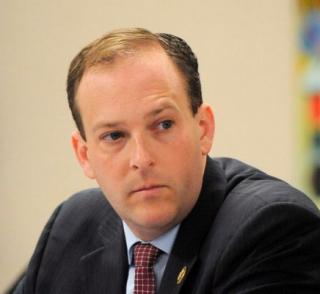Rep. Lee Zeldin (R-Shirley) will meet with constituents one on one in East Patchogue Friday, but the congressman continues to draw complaints from some district voters over his decision to hold a telephone town hall last Thursday.
Several constituents reported that they registered for the 7 p.m. teleconference but never received a follow-up call or information about how to participate.
As GOP lawmakers faced off with combative protesters decrying President Donald Trump’s agenda at in-person town hall events across the country, Zeldin opted for a teleconference. He said the call method enabled him to reach a wider audience interested in “constructive dialogue.”
Zeldin’s spokeswoman Jennifer DiSiena defended the use of the teleconference, saying the congressman received a death threat last week from a person asking him to host a town hall, but was still open to meeting with constituents one-on-one or in smaller groups.
“Our office received a request for a town hall where the person was advocating for the Congressman to be shot,” DiSiena said in an e-mail. “We forwarded that threat on to Capitol Police.”
On Zeldin’s congressional Facebook page, at least nine district residents complained that they followed his office’s instructions to register for last Thursday’s call but either never received follow-up information, or were patched into the call once it was well underway.
Alex Pashkowsky, of East Hampton, emailed Newsday to say he received a call as the hourlong conference call was nearing its end. Pashkowsky provided a screenshot of the 8:13 p.m. call he received.
Pashkowsky, said he registered for the call twice last week, and also called Zeldin’s office to get a dial-in number. He said his calls went to a full voicemail box, and that he never received notification that there was an option to listen online.
“I would have liked to participate on the live call and ask questions to clarify his positions if they were not clear,” Pashkowsky told Newsday.
After the Town Hall, dozens also turned to Zeldin’s Facebook page to complain that the congressman did not have a face-to-face forum. Of the 127 posts underneath a link to the teleconference’s audio, the bulk were from Democrats who complained about technical glitches and expressed anger that only nine callers had the opportunity to ask a question in the approximately hourlong teleconference.
A handful of Zeldin supporters weighed in and defended his actions, accusing critics of trying to incite protests.
Zeldin spokeswoman Jennifer DiSiena said, of the 303 district voters who registered to participate in the call, there were only five cases in which the office was unable to connect with registrants due to “technical issues or because they provided an incorrect or fax number.”
“If anyone experienced an issue, and would like to call us directly, we can look into each individual case,” DiSiena said in an email.
DiSiena said the teleconferencing system called about 100,000 homes in New York’s 1st Congressional District, in addition to the 303 district voters who signed up to participate in the call ahead of time. She said his office documented 9,116 callers on the line during the time of the call, and that an additional 1,015 were listening online.
As for the late calls, DiSiena said: “If someone did not connect at the first dialing out, which began at 7 p.m., they were redialed during the call to provide them with another opportunity to join the call.”
Asked about the length of Zeldin’s call, and complaints that he did not take a sufficient amount of questions in proportion to the number of people on the call, DiSiena replied that in the past “a one-hour Telephone Town Hall was always the perfect length of time, but the Congressman would be more than happy to extend the next one longer due to so much interest.”

